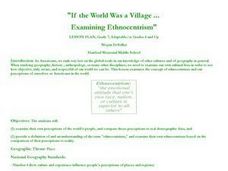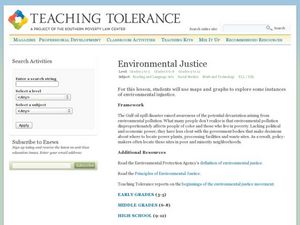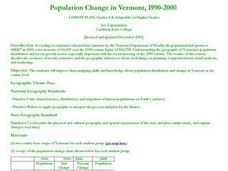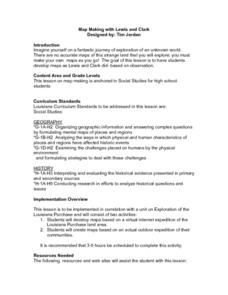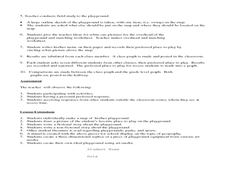Curated OER
The Geographic Doctor Seuss
Learners define the term region using semantic mapping, listen to the Dr. Seuss story Yertle the Turtle, and discuss the conflict over borders in the story. They draw a map divided into regions.
Curated OER
If the World Was a Village...Examining Ethnocentrism
Seventh graders examine their own perceptions of world's people, compare those perceptions to real demographic data, provide definition and understanding of term "ethnocentrism," and examine their own ethnocentrism based on comparison of...
Curated OER
Texas
Students draw the outline of the Lone Star State, label the state signs (bird, flower, tree), and sing the state song.
Curated OER
Urbanization and Native Hawaiian Plants
Fourth graders research plants native to the Hawaiian Islands. Using the plants, they identify its purpose in the watershed and ways to help protect them from extinction. They survey a area of land and discover ways in which to bring...
Curated OER
Leaving Home for the West - Why?
Students examine primary sources regarding American movement to the west. In this westward expansion lesson, students create broadside posters based on the Homestead Act primary sources they research.
Curated OER
Guardians of the West
Eighth graders discover the role of American buffalo in Westward Expansion. In this Westward Expansion lesson, 8th graders examine primary and secondary sources in order to create a cause and effect chart that features the treatment of...
Curated OER
Environmental Justice
Students explore the concept of environmental stewardship. In this Gulf Oil Spill lesson, students discuss how environmental pollution affects those how live in poverty at a higher rate than those with more affluence. Students read...
Curated OER
Jacksonian Democracy
Students determine how technological advancements have formed history. In this Jacksonian democracy lesson, students research innovations of the era and then compare them to the technological innovations of today. Students also debate...
Curated OER
Population Change in Vermont, 1990-2000
Students improve their mapping skills and knowledge about population distribution and change in Vermont at the county level. They are divided into groups of two or four. Each group is given two county base maps and the population...
Curated OER
Hawaii
Fourth graders become knowledgeable about Hawaii the state and Hawaii the island. They also work on reading maps of the islands. They come to know the customs, climates and other fun little facts. They also come to know the eight islands.
Curated OER
Historical Indian Treaties and Aboriginal Population
Sixth graders navigate an online atlas of Canada and compare the land area of of historical Aboriginal peoples in Manitoba to present-day figures.
Curated OER
Can You Make It? Using Natural Resources to Survive
Seventh graders describe the natural resources used to make the tools and weapons which best suited the needs of the Cherokee Indians. They will collect information regarding the making of a tool or weapon, and then explain to others...
Curated OER
Studying the States!!!
Students explore the fifty states of America. They also learn the capitals and locations of the states. They also study the population, mottos, flags, and interesting historical facts about each state.
Curated OER
Lesson 1: Culture and Resource Use
Students research an aspect of Wabanaki culture that has persisted in Maine throughout the years. They write a conversation between a Wabanaki person and an English person that shows the different cultures and negotiates a solution to a...
Curated OER
Lesson 2: The Story of Flagstaff
Students, in groups, write and perform a skit that retells the story of the flooding of Flagstaff.
Curated OER
America the Beautiful
Learners listen to story America the Beautiful, discuss places in America they have visited, define beautiful, and create and illustrate class book with pictures and words from song, America the Beautiful.
Curated OER
Wetlands: Pave or Save?
Students discuss the characteristics of wetlands and how to make them more productive. Using a map, they locate the major wetlands in the United States and color them using a key. They read an article and in groups answer discussion...
Curated OER
The Great Kapok Tree
Students read The Great Kapok Tree by Lynne Cherry. After reading the story, they center on the controversy of destroying the rain forest or conserving it. Students have to make an informed decision about rain forest destruction.
Curated OER
Map Making with Lewis and Clark
Students develop maps based on a virtual internet expedition of The Louisiana Purchase land area. They create the maps based on an actual outdoor expedition of their communities. Student create two maps, one based on the Louisiana...
Curated OER
Fish Haunts
Students examine some of the different ecosystems that fish live in. While doing this they identify the species of fish and the ecological conditions needed for survival. Students use research resources to make fish cards that have...
Curated OER
My Community
Learners identify how their school has changed. In this local community lesson, students listen to a brief history of their town and school and interview someone that graduated from their school. Learners then create a map of their...
Curated OER
Colorado
Third graders complete a variety of activities to increase their knowledge of Colorado. They make leafprints, read and listen to stories, write fiction, make collages, participate in discussions and invite their parents to come and see...
Curated OER
Where Oh Where on the Playground, Do I Love To Be?
Students listen to poem, Where Oh Where On the Playground, Do I Love to Be?, and practice reading, interpreting, and making maps, charts, and graphs in surveying classmates and discussing their favorite places to play in school playground.
Curated OER
The Immigrant Experience
Students utilize oral histories to discover, analyze, and interpret immigration and migration in the history of the United States. A goal of the unit is fostering a discussion and encouraging students to make meaning of the bigger...



